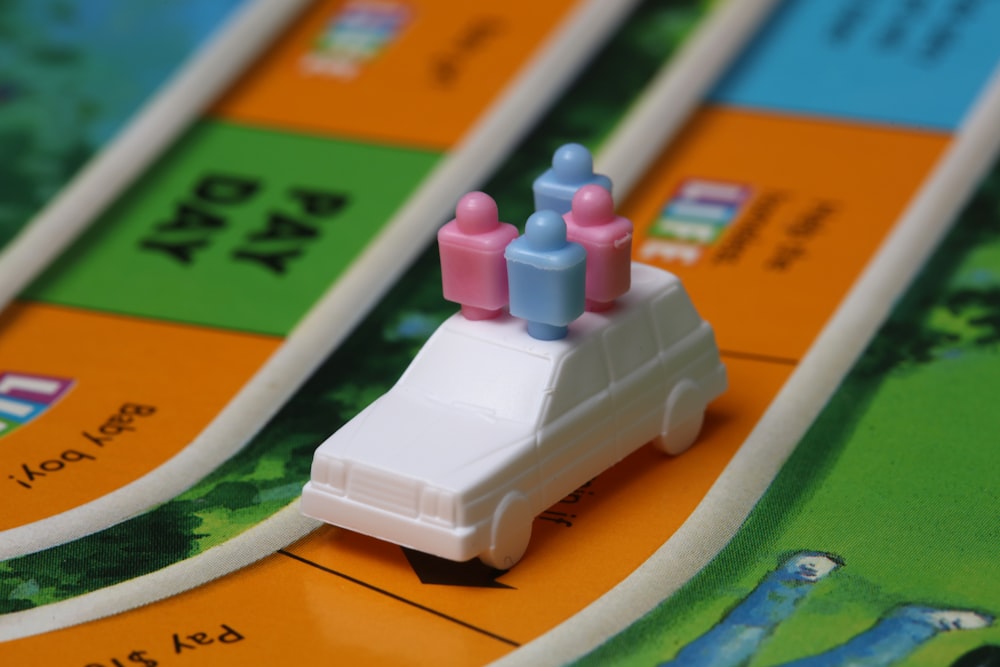When I was in college, I spent a weekend with a friend in her hometown. It was fun meeting her family and seeing where she grew up. But what I remember most from that weekend was laughing at my own misfortune during a game of LIFE, the classic board game of pretend careers, family, and the ups and downs of being an adult.
I led most of the game. Then, like life itself, I hit a rough patch. I landed on a square that said “GO BACK 16 SPACES” three times in a row. THREE TIMES IN A ROW! Needless to say, by the time I finally got past that cursed square, my friend and her father had both passed me, and I lost the game.
While my friend and I still laugh about that night, playing a simple board game provided a creative way to engage with her family. The game allowed us to interact in a much different way than we would have sitting around the living room making small talk.
When it comes to living a more creative life, small steps lead to big results. Playing board games is a perfect example of how you can engage creative skills through simple activities for everyone in your family, and even in the workplace.
The various skills board games require encourage creative instincts. When you use different areas of the brain while playing a game, those skills become easier to use in other areas of life, whether in a personal/family sense or for a business project.
Board games enhance many creative skills, depending on the type of game. Five common creative skills learned from board games include:
PHYSICAL DEXTERITY – Especially for young children, or those with physical limitations of some sort, fine motor skill development takes practice. Picking up and moving game pieces and cards helps children practice skills needed to hold a pencil, use scissors, and type on a keyboard. Many board games involve moving pieces, rolling dice, or arranging cards. For children or those with physical disabilities, simple movements made while playing a board games can help develop muscle memory that translates to daily activities like holding a fork or folding laundry. Also, physical dexterity is crucial for creative activities including painting, dancing, or playing a musical instrument.
PROBLEM SOLVING – Throughout a game, players make various decisions about their actions. Whether it’s which properties to buy, which cards to play, or which cooperative strategies to employ, players need to think ahead to their next move and anticipate moves other players might make. Some games require more advanced problem-solving skills than others, but all games require at least some ability to plan ahead for different possible outcomes. The ability to plan ahead is needed in every area of life, whether for a parent planning summer daycare options or a computer coder anticipating possible security concerns in a new program.
SEQUENCING – Many board games require players to create sets of similar pieces or play cards in a particular order. For younger players, number and color sequencing helps them recognize patterns in other things around them. For adults, sequencing at higher levels requires an ability to break down a larger process into smaller steps. These skills help business and technical professionals develop efficient processes for completing large projects.
COLLABORATIVE THINKING – A newer trend in board game design is one where players work together to beat the game rather than competing with each other. In collaborative games, players give each other clues or share cards that help others decide how to play their own pieces. By working together to win the game, players shift focus from their own actions to how they can help each other. Collaborative games promote teamwork and sharing ideas. Applying these same collaborative approaches to the workplace allows people to communicate with co-workers and generate new ideas together.
COMMUNICATION – With any type of game, talking to other players necessary. Whether it’s reading instructions on a card or announcing where they are moving a piece, players talk to each other throughout the game. In more strategic games and collaborative games, communication with other players is a central feature of the game. Because of the need to talk each other, board games are a great way for families to interact with each other that doesn’t involve talking about homework or dentist appointments. For employers, incorporating a board game into the dreaded team building activities, encourages employees to communicate in a fun way and build strategies in a more creative way than the old “Two Truths and a Lie” game.

Creativity requires thinking differently. So the next time you want a fun family night, or need a new team activity at work, try out a new board game. There are so many more games out there than the old-school games like Monopoly or Scrabble (not that there’s anything wrong with old-school). Try something new, and engage those creative skills in a simple, fun way.
Just watch out for those Go Back 16 Spaces squares.
Coming Up: In the second part of my look at how board games promote creativity, I talk with Jenny Kramar, co-founder of the GameSchool Project, on how board games help students develop both creative and academic skills in an educational setting.
Reignite your creativity!

Subscribe to get new content, monthly newsletter, and important updates. You'll also receive a free download - "30 Days of Creative Inspiration."


